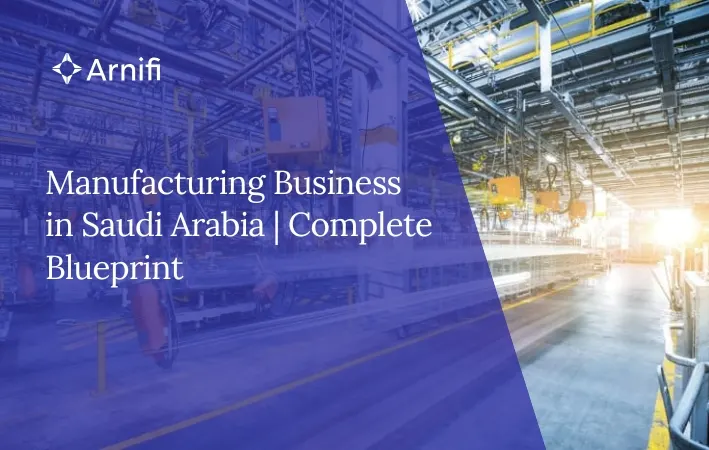How to Start a Manufacturing Business in Saudi Arabia? | A Detailed Guide
by Shethana Jul 01, 2025  5 MIN READ
5 MIN READ

Saudi Arabia’s economy is no longer solely defined by oil. As part of the Vision 2030 initiative, the country is opening up vast opportunities for entrepreneurs in sectors like manufacturing. With strategic location, government support, and tax incentives, Saudi Arabia is fast becoming a global manufacturing hub. But how do you actually set up a manufacturing business in the Kingdom?
Here’s a step-by-step guide to help you understand the process, legal requirements, and potential benefits of starting your own manufacturing venture in Saudi Arabia.
Table of contents
Why start a manufacturing business in Saudi Arabia?
The Kingdom offers a combination of business-friendly policies, modern infrastructure, and access to international markets. Here’s why investors are turning to KSA:
- Strategic Location: At the crossroads of Asia, Europe, and Africa.
- Access to Raw Materials: Particularly in petrochemicals, plastics, metals, and more.
- Special Economic Zones (SEZs) With incentives like tax exemptions and customs relief.
- Skilled Workforce Development: Through national training programs and partnerships.
Procedure to start a manufacturing business in Saudi Arabia
Step 1: Choose Your Manufacturing Activity
Start by identifying your manufacturing sector. Whether you plan to produce food products, textiles, machinery, or chemicals, it’s essential to define your scope. This will help determine licensing requirements and regulatory approvals. Each sector may have specific environmental, health, or safety standards you’ll need to meet.
Step 2: Get Investment License from MISA
Foreign investors must obtain an investment license from the Ministry of Investment of Saudi Arabia (MISA). This is the foundation of any foreign-owned business in the Kingdom.
Requirements include:
- Business plan
- Financial statements
- Passport copies of shareholders
- Company structure and details
Once approved, MISA grants you legal permission to operate in the Saudi market.
Step 3: Register Your Company
With the investment license in hand, you’ll need to register your business with the Ministry of Commerce (MoC). The process involves:
- Choosing a company name (in Arabic and English)
- Drafting Articles of Association
- Registering with the Chamber of Commerce
- Obtaining a Commercial Registration (CR)
This officially sets up your company as a legal entity.
Step 4: Apply for Industrial License
Manufacturing businesses require an Industrial License from the Ministry of Industry and Mineral Resources. This license ensures your factory operations comply with industrial laws and zoning rules.
To obtain it, you’ll need to submit:
- Site layout and factory plan
- Details of machinery and equipment
- Environmental and safety documents
- Capital investment and workforce plan
The ministry may inspect your facility before issuing the license.
Step 5: Select a Location and Facility
Saudi Arabia offers various industrial zones such as MODON, Jubail Industrial City, and the King Abdullah Economic City (KAEC). These zones provide ready-made infrastructure, utilities, and connectivity.
Choosing the right location depends on:
- Proximity to raw materials
- Access to ports or logistics
- Industry-specific clusters
Renting or buying industrial land should align with your production needs and long-term goals.
Step 6: Secure Municipal Approvals and Environmental Clearance
Before you begin construction or operations, you’ll need:
- Municipal approval for your factory building
- Civil Defense approval for fire safety
- Environmental permits for pollution control, especially if handling chemicals or emissions
These steps ensure you meet Saudi Arabia’s sustainability and safety standards.
Step 7: Hire Employees and Apply for Visas
Once your facility is ready, you can start recruiting employees. You’ll need to register with the General Organization for Social Insurance (GOSI) and the Ministry of Human Resources.
Additionally:
- Apply for work visas for foreign staff
- Comply with Saudization policies, which require a percentage of Saudi nationals in your workforce
Hiring local talent can also open doors to government incentives.
Step 8: Import Machinery and Start Production
Saudi Arabia allows duty-free import of industrial equipment if it’s for manufacturing purposes. Ensure all machinery meets technical standards and safety requirements.
Once setup is complete:
- Run test operations
- Comply with quality checks and production guidelines
- Register with the relevant authorities for product certification
Benefits of manufacturing business in Saudi Arabia
Starting a manufacturing business in the Kingdom brings multiple advantages:
- 0% income tax for GCC nationals
- No restrictions on capital repatriation
- Access to low-cost energy and utilities
- Support from the National Industrial Development Program (NIDP)
- Government grants, subsidies, and soft loans
Moreover, being part of the Vision 2030 transformation means your business is aligned with national growth strategies.
Challenges
Despite the advantages, entrepreneurs should be prepared for:
- Navigating bureaucracy and Arabic documentation
- Adhering to local labor and Saudization rules
- Understanding customs and logistics timelines
Partnering with a local business setup consultant can significantly ease the process and reduce costly delays.
Conclusion
Saudi Arabia’s manufacturing landscape is booming, and it’s not just for big players. Small and mid-sized businesses can also tap into this expanding sector with the right planning and execution.
If you’re ready to enter the Saudi market, take time to understand the regulations, choose the right industrial zone, and build a solid local team. With strong support from the government and a clear vision for the future, your manufacturing business can thrive in KSA. Book a free consultation now!
Also Read: How to start a trading business in Saudi Arabia?
Top UAE Packages

Related Articles
Top UAE Packages



